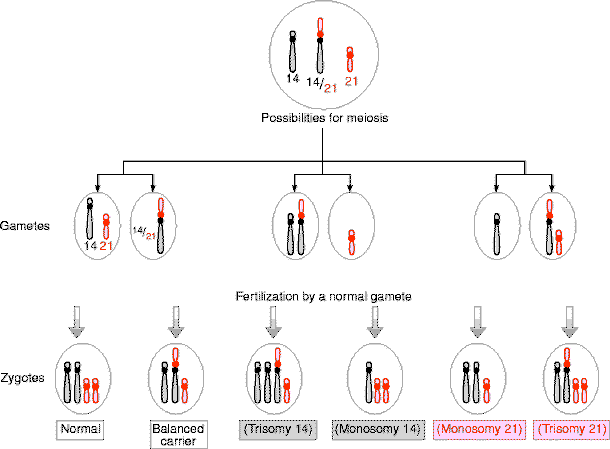| Centric fusion (Robertsonian) translocation | |
 |
Results from breakage of two acrocentric
chromosomes (numbers 13, 14, 15, 21, 22) at or close to their centromeres,
with subsequent fusion of their long arms to form one chromosome.
(The short arms of each chromosome are lost but this is of no clinical importance). The total chromosome number in a Robertsonian translocation carrier is therefore reduced to 45.
|
|
As no gain or loss of important genetic material occurs, Robertsonian translocation carriers are normal. Incidence in general population is approximately 1 in 1000, the commonest being fusion between chromosome 13 and 14.
|
|
| Results of meiosis in a carrier of a Robertsonian translocation. | |
 |
|
| Robertsonian translocation
carriers are asymptomatic but often produce unbalanced gametes which can
result in monosomic or trisomic zygotes.
Of the possible segregants, monosomy 14, trisomy 14 and monosomy 21 are lethal. The remaining possibilities are a child with normal chromosomes, a child with the balanced translocation, and a child with Down syndrome due to the unbalanced form of the translocation causing trisomy 21. This child has inherited the Robertsonian translocation 14-21 chromosome as well as a normal chromosome 21 from the carrier parent, and a normal 14 and a normal 21 chromosome from the other parent. A parent who is a carrier for a Robertsonian translocation involving chromosome 21 therefore has a high risk of having a child affected with Down syndrome, compared with the low recurrence in regular trisomy 21 Down syndrome (which is due to an error in cell division, and has a recurrence risk of about 1 in 100). The observed figures for Robertsonian translocation carriers involving chromosome 21 having a live born baby with Down syndrome are 10% if the mother is the translocation carrier, and 2.5% if the father is the translocation carrier. Diagrams of translocation segregation from Human Molecular Genetics (Strachan and Read)
|
|